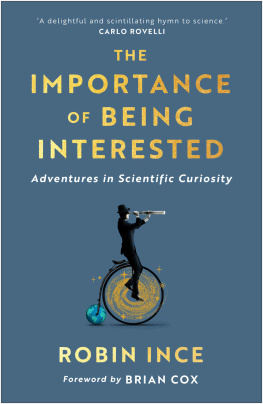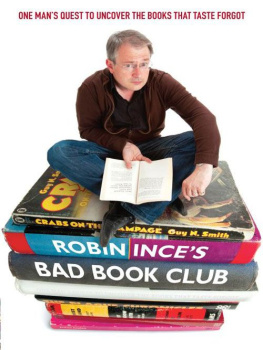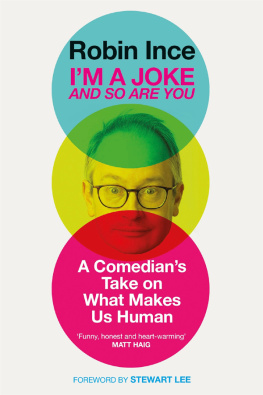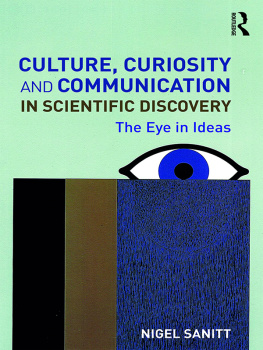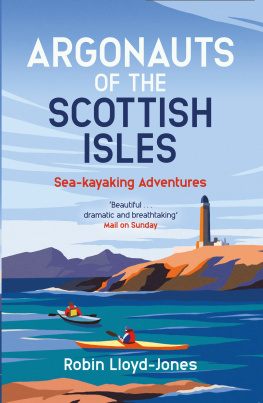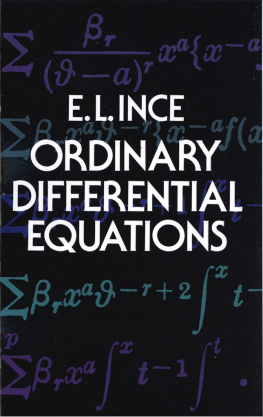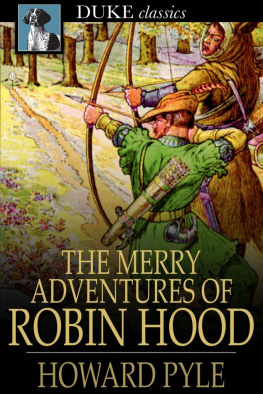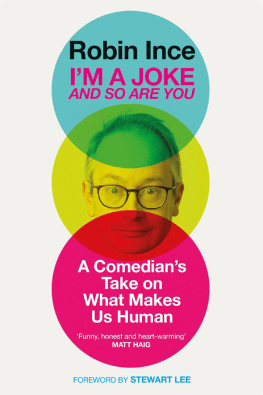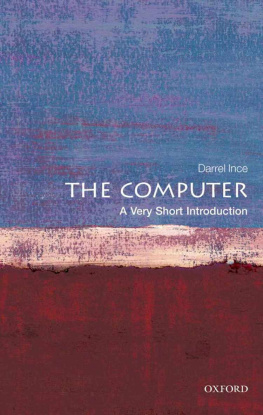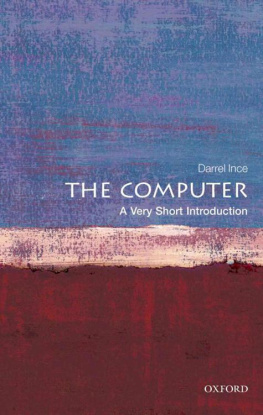Robin Ince - Importance of being interested : adventures in scientific curiosity
Here you can read online Robin Ince - Importance of being interested : adventures in scientific curiosity full text of the book (entire story) in english for free. Download pdf and epub, get meaning, cover and reviews about this ebook. year: 2021, genre: Religion. Description of the work, (preface) as well as reviews are available. Best literature library LitArk.com created for fans of good reading and offers a wide selection of genres:
Romance novel
Science fiction
Adventure
Detective
Science
History
Home and family
Prose
Art
Politics
Computer
Non-fiction
Religion
Business
Children
Humor
Choose a favorite category and find really read worthwhile books. Enjoy immersion in the world of imagination, feel the emotions of the characters or learn something new for yourself, make an fascinating discovery.
- Book:Importance of being interested : adventures in scientific curiosity
- Author:
- Genre:
- Year:2021
- Rating:5 / 5
- Favourites:Add to favourites
- Your mark:
- 100
- 1
- 2
- 3
- 4
- 5
Importance of being interested : adventures in scientific curiosity: summary, description and annotation
We offer to read an annotation, description, summary or preface (depends on what the author of the book "Importance of being interested : adventures in scientific curiosity" wrote himself). If you haven't found the necessary information about the book — write in the comments, we will try to find it.
Robin Ince: author's other books
Who wrote Importance of being interested : adventures in scientific curiosity? Find out the surname, the name of the author of the book and a list of all author's works by series.
Importance of being interested : adventures in scientific curiosity — read online for free the complete book (whole text) full work
Below is the text of the book, divided by pages. System saving the place of the last page read, allows you to conveniently read the book "Importance of being interested : adventures in scientific curiosity" online for free, without having to search again every time where you left off. Put a bookmark, and you can go to the page where you finished reading at any time.
Font size:
Interval:
Bookmark:

Being Interested
A delightful and scintillating hymn to science. Resolutely a non-scientist, Robin Ince discovers with awe that when science addresses the big problems and destroys familiar beliefs, it does not leave us in a cold, meaningless and dehumanized world, but in one that is colourful, human, and full of intensity and wonder.
Professor Carlo Rovelli
Robin Ince is the co-creator and presenter of the BBC Radio 4 show The Infinite Monkey Cage, which has won multiple awards, including the Sony Gold and Rose dOr. In 2019 he played to over a quarter of a million people with Brian Cox on their world tour which has put them in the Guinness Book of Records for the most tickets sold for a science show. He is author of Im a Joke and So Are You and also won Celebrity Mastermind but forgot that calcium was the dominant element of chalk. He is currently trying to invent an effective satnav for people who believe the world is flat.

First published in hardback and trade paperback in Great Britain in 2021
by Atlantic Books, an imprint of Atlantic Books Ltd.
Copyright Robin Ince, 2021
The moral right of Robin Ince to be identified as the author of this work has been asserted by him in accordance with the Copyright, Designs and Patents Act of 1988.
All rights reserved. No part of this publication may be reproduced, stored in a retrieval system, or transmitted in any form or by any means, electronic, mechanical, photocopying, recording, or otherwise, without the prior permission of both the copyright owner and the above publisher of this book.
1 2 3 4 5 6 7 8 9
A CIP catalogue record for this book is available from the British Library.
Hardback ISBN: 978 1 78649 262 3
Trade Paperback ISBN: 978 1 83895 429 1
E-book ISBN: 978 1 78649 263 0
Chapter header illustrations by Mecob, based on images from Shutterstock.
Internal illustrations: p36 Getty Images; p91 Robin Ince; p103
Wikimedia images; p138 European Space Agency; p168, p355
NASA; p353 ADAGP, Paris and DACS, London 2021.
Printed in Great Britain.
Atlantic Books
An imprint of Atlantic Books Ltd
Ormond House
2627 Boswell Street
London
WC1N 3JZ
www.atlantic-books.co.uk
To all the librarians and teachers who have
encouraged our curiosity,
And to my sister,
sometimes Camilla, sometimes Janey,
depending on whether my parents
thought she was being good or bad,
who has maintained her fascination with the world
while often keeping it turning for other people.
This now puts huge pressure on me to dedicate my next book to my other sister, Sarah. I will try to write one as soon as possible.
Richard Feynman once wrote that scientists most valuable transferable skill is a deep and intimate experience with doubt. Its difficult to motivate yourself to spend a life in research if you believe you know everything, and even the most self-confident research scientist will ultimately be humbled by their encounters with Nature. This is the best argument I know for maintaining at least a small component of science throughout every citizens education. I once half-jokingly wrote that the PPE course at Oxford, studied in the loosest sense of the word by many a cabinet minister, should be rebranded PPES; perhaps brushing up against Nature occasionally would moderate their certainty. After all, as Feynman also pointed out, democracy itself rests on the acceptance that we dont really know how to run a society; thats why we change our politicians every four or five years. If you think you know how to run a country, if you think your policies are absolutely right and the other lot are absolutely wrong, you are not a democrat.
Robert Oppenheimer came to similar conclusions in his 1953 BBC Reith Lectures. Nature forces us to hold seemingly contradictory ideas in our heads in order to understand what we observe. A thing as simple as an electron is sometimes best thought of as a wavy, extended object and sometimes as a point-like speck. Crucially it is neither, but both pictures are necessary components of our understanding. Similarly, society may appear to be riven by tensions between the competing human desires for individual freedom and collective responsibility: but riven is the wrong word, because both desires are present in every individual and both are therefore necessarily present in society. The democratic process gently swings the pendulum one way and the other, and the swing is both the manifestation and guarantor of our freedom.
Your freedom, then, is protected by your acceptance that you might be wrong, and science is a sure-fire way of forcing you to practise being wrong. Which brings me neatly to my friend and colleague Robin Ince. He describes his role on The Infinite Monkey Cage as that of professional idiot. He means this in a self-deprecating way; indeed, he has elevated heartfelt self-deprecation to something of an art form. From his wardrobe to his gait, he radiates uncertainty. But, as I have argued, there is no more valuable skill. There are two categories of idiot: the curious idiot a category that includes all scientists and the idiot a category that includes all who are certain. Robin is a category one idiot, and thats why hes an engaging and wise guide.
Robins thirst for knowledge is unquenchable, and in these pages he engages in debates and conversations with a dazzling cast of great minds in search of a little enlightenment; not absolute enlightenment, because thats not on offer. We do not understand the human mind, we do not know what it means to live a finite life in an infinite universe, and we do not know whether or not there is a God. If answers exist, they reside in unknown terrain, and thats what makes them interesting. Its important to explore that terrain with humility and an open mind. Its important to be interested.
Brian Cox
July 2021
In studying how the world works we are studying how God works, and thereby learning what God is. In that spirit, we can interpret the search for knowledge as a form of worship and our discoveries as a revelation.
Frank Wilczek

T he moment I put my hand in my school-blazer pocket and found it full of frog entrails, I already knew science was not for me.
As a young child, I loved science. Primary-school science classes were full of excitement, whether it was interrogating leaves or watching Robert Calvert see blood and then faint and smash in his front teeth. In secondary school, though, this joy evaporated. I think many people lose their interest in science at secondary school, and I was one of them. This is where science became serious, but also where it became joyless. This is where the equations and explanations seemed detached from my own experience. Whatever science was, it was not lived experience. It was as if scientists only thought in sums. They didnt daydream and play. Each day they opened their box of numbers and symbols and moved them about until they were satisfied: Ive carried the two and now I am satisfied that I have a testable wave function.
Font size:
Interval:
Bookmark:
Similar books «Importance of being interested : adventures in scientific curiosity»
Look at similar books to Importance of being interested : adventures in scientific curiosity. We have selected literature similar in name and meaning in the hope of providing readers with more options to find new, interesting, not yet read works.
Discussion, reviews of the book Importance of being interested : adventures in scientific curiosity and just readers' own opinions. Leave your comments, write what you think about the work, its meaning or the main characters. Specify what exactly you liked and what you didn't like, and why you think so.

